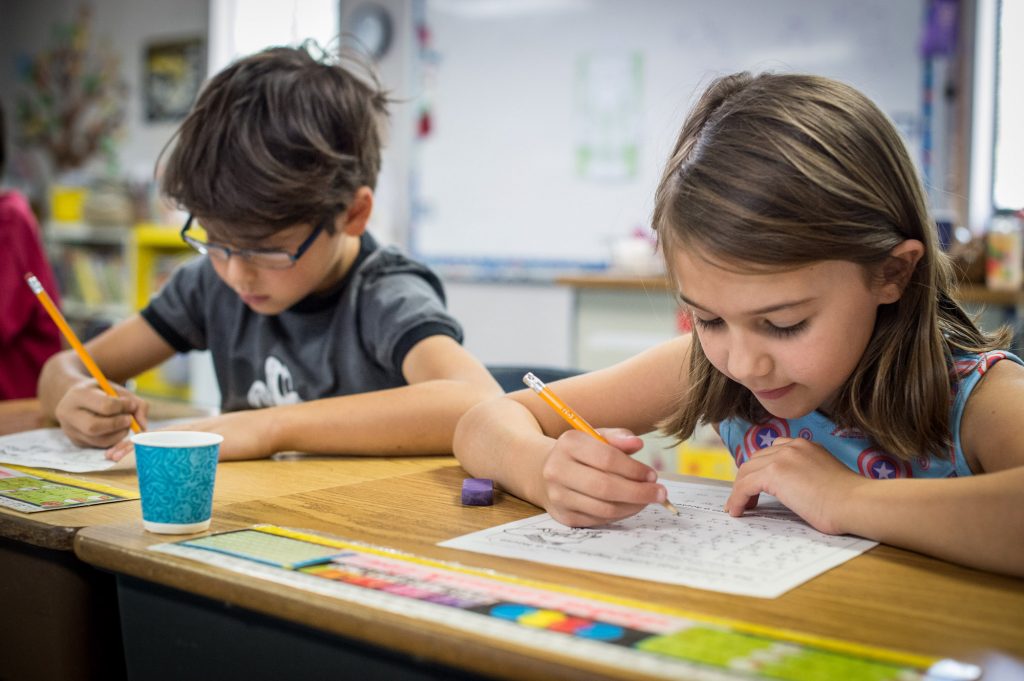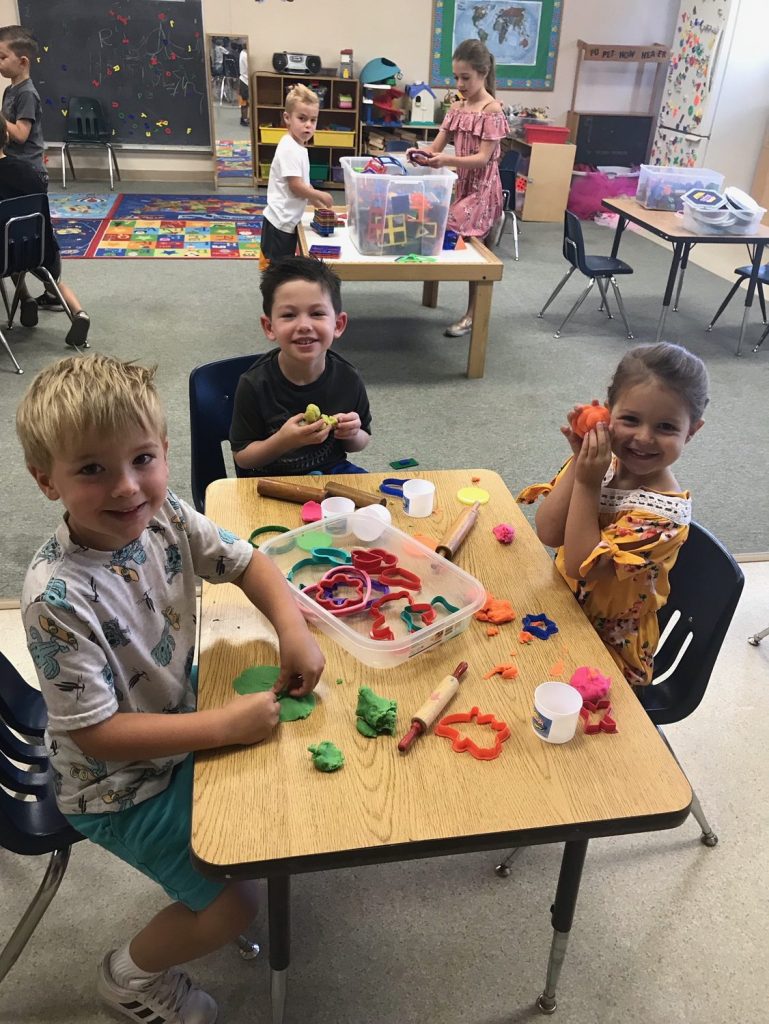
Our Curriculum
Our curriculum rises up to result in our reputation as a leader of education within the community.
Castlehill Country Day School places an emphasis on education driven by a curriculum that engages children in interactive learning, providing core skills for children in Kindergarten through Fifth Grade. Based on our educational models that have provided over 30 years of experience in education, our curriculum is designed for all students, regardless of their backgrounds, to show significant growth in achieving Arizona State Standards. At Castlehill, we prepare our students to thrive in higher education and careers after graduating our school.
Castlehill differs from other schools because of our approach to each core academic area. We distinguish ourself by viewing each child as an individual who can have learning that is tailored to their personal needs, rather than narrowing students’ learning to a single philosophy, therefore achieving a deeper, rich passion for learning.

English Language Arts
Program Philosophy
Each classroom within Castlehill Country Day School provides a literature based program that arches the Arizona State Standards of Reading, Writing, Speaking and Listening, and Language strands within each classroom and academic subject. With decades of practice, and a well integrated school philosophy established, our student body has been successful in achieving a love of literacy.
Our goal is to have our students not only competent in each of the English Language Art strands, but engaging with them in a number of classic and new ways based on the latest research. It is our careful tailoring of curriculum, through fiction and non-fictional materials, that gives our students multiple ways to learn depending on what connects to them the most. Driven by data and facts to accomplish results in competency, we want our students to relish English Language Arts as a key to social and emotional development that is carried throughout their lifetime.
Materials for Learning in English Language Arts
- Write Source
Print and Digital Hybrid for learning Common Core standards in writing process, including writing forms, grammar, usage, and mechanics of writing.
- Grammar Books
Classic books of learning English grammar, with updated versions for the best understanding of recent grammar changes in the language.
- SRA Reading Laboratory
Gives students a tailored experience vocabulary, fluency, word analysis, and study skills with a vast library of fiction and non-fiction resources for students to learn from.
- Macmillan McGraw-Hill and Harcourt Texts
Delivering superior classroom materials for reading and spelling competency designed around Common Core State Standards for children in elementary school.
- Castlehill Country Day School Library
Resource for school with books in areas of fiction and non-fiction including: poetry, history, biology, geography, mythology, and mathematics – all based in a story format to serve each child’s interest.
English Language Arts Strands
Reading
Our students are given opportunities to all our our resources within Castlehill Country Day School. These materials in the classroom, along with our superior teacher instruction, give students time to critically think of the texts that they read to spur emotional development. Naturally, an understanding of grammar and phonetics develops through repetition of daily reading activities.
By having discussions within group sessions or individually, students know to explore deeper themes and meanings behind what events they observe, like plot structure and character dynamics. This questioning spurs an eye to analyze books based on finer points, such as grammar and lyricism, to appreciate the author’s skill in story telling. Reading, when delivered with our skills and passion, means children are prepared to see the world in a rich, complex and meaningful way.
Reading Competency Areas
- Phonetics
- Grammar
- Spelling
- Word Competency
- Social Relations
- Theme Comprehension
- Character Dynamics
- Plot Structure
- Mixed Media Interpretation
Writing
Our school meets the requirements of writing by allowing students a diverse range of opportunities to explore writing and its related objectives. Within each classroom, our teachers cover various subjects within history, mathematics, art, computers, and science – all of which incorporate writing. As a subject which can be practiced repetitively our students, regardless of backgrounds writing experience, learn how to write fluently.
Teachers create projects centered around themes, driven by student interests, to assist in opportunities for research. This information gathering, by print and digital means from our English Language resources, aids in students understanding deeper meanings behind the topics that are investigated. Our classrooms become resourceful places, where both short and longer sessions of writing can take place, for students to refine how they interpret the ideas of themselves and others. Beginning with markings of an eager crayon, our student body becomes confident in what the power of a written word can do.
Writing Competency Areas
- Narrative Creation
- Short and Long Writing Sessions
- Written Claims
- Clear Written Ideas
- Capitalization
- Punctuation
- Use of Technology
- Information Gathering
- Research for Theme Support
Speaking and Listening
Paramount to a child’s experience in the world is the way in which they interact. An ability to speak and listen, to others and yourself, is the core of what speaking and listening entails. At Castlehill Country Day School, our students engage in lessons that bring about active discussions. From group activities during physical development to presenting projects at the science fair, students are encouraged to dive deeper into topics of interest.
These conversations, facilitated by both teachers and peers, allow for groups to see everyone’s view points and discuss them in a positive, constructive way. The deeper level of interpretation, by discussion, visual, and mixed media means, is structured in a setting to allow for deep critical thinking. Knowing that students can express ideas, be heard, and provide feedback is not only supportive of deeper learning, but essential to pillars of community respect in our school and beyond.
Speaking and Listening Competency Areas
- Collaborative Conversation
- Speech Versatility
- Media Evaluation
- Speaker’s Point of View
- Idea Expression
- Presentation Comprehension
- Grasp of Reasoning
- Visual Data Interpretation
- Command of English Language
Language
Paramount to a child’s experience in the world is the way in which they interact. An ability to speak and listen, to others and yourself, is the core of what speaking and listening entails. At Castlehill Country Day School, our students engage in lessons that bring about active discussions to broaden vocabulary knowledge base. From group activities during physical development to presenting projects at the science fair, students are encouraged to dive deeper into topics of interest.
These conversations, facilitated by both teachers and peers, allow for groups to see everyone’s view points and discuss them in a positive, constructive way in conventional English. The deeper level of interpretation, by discussion, visual, and mixed media means, is structured in a setting to allow for deep critical thinking and analyzation. Knowing that students can express ideas, be heard, and provide feedback is not only supportive of deeper learning, but essential to pillars of community respect in our school and beyond.
Language Competency Areas
- Word Grasp
- Sentence Structure
- Language Analyzation
- Vocabulary Knowledge
- Word Relationships
- Figurative Meaning
- Contextual Language
- Grammar Tenses
- Convention English
Mathematics
Program Philosophy
Math has been one subject that, above most, needs an innovative approach to learning. Students with a strong grasp of math can branch out into a wide variety of subjects, including medicine, science, engineering, architecture, and even art which has a basis in spatial relations. Having a strong concept of the mathematical learning at our school is one way that makes our approach stand out for our children in every grade level.
Students, when giving concrete learning materials from manipulatives and visual objects, can learn to prosper in mathematical concepts in ways that they find interesting. Classroom discussions with a base in group learning and individual sessions of study can both facilitate each student, broadening how they approach mathematical concepts. Our tested and tried methods, from our decades of experience, have brought about a legacy of students grasping about how fascinating math can be.
Materials for Learning in Mathematics
- Mountain Math
Classroom materials to support interactive visual and tactile learning in group instructor led sessions and individual free form study.
- Minute Math Flashcards
Digital and print flashcards for students to use that is simple and based in game-like strategies for repetition and math retention.
- Math Manipulatives
Learning from concrete materials, students begin with math concepts that eventually transition into abstract concepts after learning tactile foundations.
- Macmillan McGraw-Hill and Harcourt Texts
Delivering superior classroom materials for mathematics competency designed around Common Core State Standards for children in elementary school.
- STEM – Mathematics
Guideline initiated by U.S. Depeartment of Education to facilitate promotion of science, technology, engineering, and mathematics – which guidelines we use to spur the interest of our students in those fields.
Mathematical Competency Areas
- Operating Whole Numbers
- Number Comprehension
- Shapes and Space Relating
- Counting Sequence
- Data Interpretation
- Abstract Reasoning
- Building Fractions
- Angles and Measurements
- Analyze Patterns
Social Studies
A grasp of the larger world, both in environmental and cultural terms, is needed for children to appreciate how vast of a place we truly exist within. Integrated into the daily curriculum at Castlehill Country Day School is the ideas and concepts of social studies, with an emphasis on current events within our community as well as on a global scale. Weekly presentations, done by students bringing in news clippings, encourage an understanding of social dynamics, geography, and linguists. As our students seek out information, an awareness of the world around them comes into account to enrich their daily lives.
